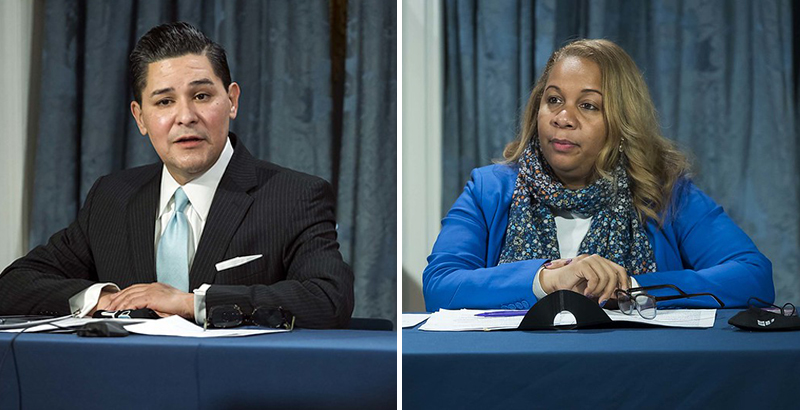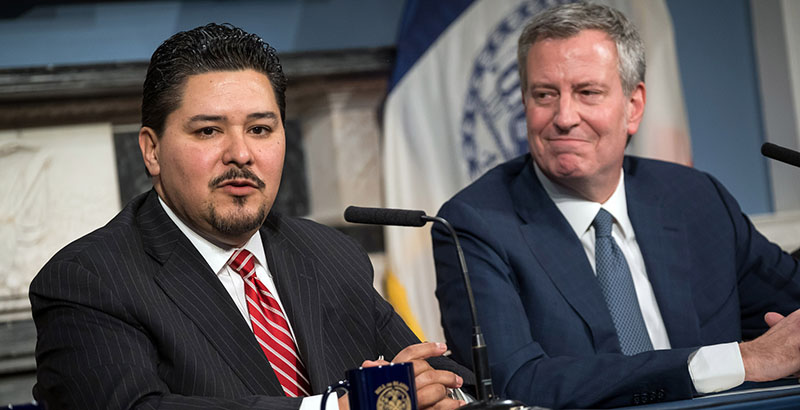NYC Schools Get First Black Female Chancellor as Carranza Abruptly Resigns During Ongoing COVID Crisis

Bronx parent Farah Despeignes awoke to what she considered good news Friday, 11 months into a painful pandemic that brought not only trauma and loss, but also a series of missteps over reopening New York City’s schools.
Bronx Executive Superintendent Meisha Ross Porter, whom Despeignes had worked with in her role as president of the borough’s District 8 Community Education Council, would replace Richard Carranza, who had abruptly resigned as New York City schools chancellor, effective March 15.
The new appointment gave Despeignes some hope, even amid the ongoing coronavirus crisis, which has left about 70 percent of city students still learning remotely, including her own two children.
“She’s an activist educator,” Despeignes said of Porter, who grew up in Queens attending NYC public schools and has since worked as a teacher, principal, superintendent and, after being promoted by Carranza, executive superintendent. “It’s a good thing for the Bronx, a borough that’s been left behind for so long. She’ll be able to speak from the point of view of the most vulnerable. I know she’s committed to equity and making our voices heard.”
In accepting what is considered the second most high-profile education job in the country after U.S. education secretary, Porter said she felt honored, and pledged to center trauma recovery in fully reopening the nation’s largest school district.
“I think it’s going to be super important, as we continue our reopenings,” she said. “The first thing I’m looking forward to is reopening high school, and focusing on how we reopen schools fully in September. Mental health is at the core of that. Supporting the social-emotional needs of our students is at the core of that. I look forward to doing that work in the new school year, and as we get through the next three to six months of this school year.”
At the same time, she affirmed that the concerns of front-line educators would be uppermost in her mind.
“That’s what I promise to do,” she said. “To never forget what it meant to be in a classroom, with students and planning lessons … Especially in this moment, for teachers who are grappling with remote classes and in-person classes. I promise to never forget that.”
Porter will be the first Black woman to run New York City’s public schools, a deeply segregated system, where about a quarter of the nearly 1 million students are African American, 40.6 percent are Hispanic, 15.1 percent are white and 16.2 percent are Asian. Almost 73 percent are low-income, about 20 percent are students with disabilities, and 13.2 percent are English language learners.
Shattering that racial and gender leadership ceiling meant something to Despeignes. “As a Black woman, it feels good,” she said.
Her optimism is tentative, however: years of engagement with the hard-edged politics and byzantine bureaucracy of the city’s school system have taught her that the same limitations that held Carranza back, in her view, could potentially hinder Porter, too.
“The culture of the DOE has to change,” she said. “… My prayer for Meisha is that they will not resist her as much … Under Carranza, there was a lot of pushback. He probably could have done better, if there was less resistance.”
Porter is taking over in the midst of a mayoral campaign with some 30 candidates vying to replace a term-limited Mayor Bill de Blasio. The victor, who will largely be determined in the June Democratic primary, will probably have their own agenda for running the city’s schools, meaning that Porter could potentially hold office for a mere 10 months.
Politics and power struggles reportedly lay at the heart of Carranza’s departure. The New York Times Friday attributed it mainly to a long history of discord between Carranza and de Blasio around school desegregation, tensions that reached a boiling point last month over the city’s testing of 4-year-olds for admission to its gifted and talented program. At a press conference Friday morning, Carranza didn’t deny those differences, but said he was leaving due to personal, pandemic-related losses.
“Make no mistake, I am a New Yorker, while not by birth but by choice. A New Yorker who has lost 11 family and close childhood friends to this pandemic. And a New Yorker who quite frankly needs to take time to grieve,’’ he said. “I feel that I can take that time now because of the place that we are in and the work that we have done together.”

Since he assumed the schools chancellor role three years ago, following a public spectacle when Miami schools chief Alberto Carvalho turned down the job on live television, Carranza has encountered a range of obstacles to his vision on school desegregation and equity.
He tried and failed to get rid of the admissions exam for the city’s elite specialized high schools. Most recently, he and the mayor butted heads over how quickly the administration would dispose of the test used for admitting preschoolers to the city’s G&T program. Both the specialized high schools and the gifted and talented programs are overwhelmingly white and Asian. Carranza’s efforts and blunt language around desegregating the city’s schools have been met with opposition from some and intense backlash from others, including some Asian-American parents, who saw the push to get rid of the entrance exam as harmful to their children and discriminatory to their community.
Then, the pandemic struck. The crisis opened the door for Carranza to make good on some of his equity-related promises: he and de Blasio ordered middle schools to suspend all admissions-related screens for a year, in favor of a random lottery system. They scrapped the geographic priority policy that gave students living in certain affluent areas preference to sought-after schools. And they gave grants to districts coming up with their own diversity plans.
In Friday’s press conference, the mayor promised more desegregation updates come September, saying that the pandemic presented “a new moment of opportunity” for Albany to reconsider its approach to the specialized high schools’ entrance exam. He also alluded to the role that technology could play in reimagining the gifted and talented program.
“G&T as we have known it is gone,” he said. “In September, you’ll see an entirely different approach.”
Teens Take Charge, a student activist group which has pushed aggressively to integrate the schools, in a statement Friday blamed de Blasio for a lack of progress, saying he had repeatedly obstructed Carranza on desegregation. De Blasio “fought behind closed doors to maintain the unequal status quo that benefits privileged families,” the group charged, and expressed hope that Porter’s tenure would produce real policy changes and empower student decision-making.
Ultimately, the defining event of Carranza’s term was an unprecedented public health crisis. Nearly a year into the pandemic, after a series of starts and stops from officials and concerns over viral spread, many families feel unheard and afraid of returning to buildings while other vocal parent groups are dissatisfied with the level of in-person learning available to children. With disruptions, some extended, elementary school buildings and schools for students with complex special education needs have been open for hybrid learning since September, while middle schools returned to school Feb. 25 for the first time since November. The mayor on Wednesday promised an update on reopening high schools in the coming weeks.
Despite the upheaval and ongoing difficulties, Carranza was able to reopen schools when almost all of his big city school district peers were not and while some still have not brought students back nearly a year after the initial shutdown.
“We have achieved something amazing,” de Blasio said, of getting students back into schools during COVID. “Thank you Chancellor Carranza because it never would have been possible but for your leadership.”
Advocates for Children Executive Director Kim Sweet also thanked Carranza for his service “especially in the face of unprecedented challenges this past year” and congratulated Porter “on her historic appointment.”
“She definitely has her work cut out for her,” Sweet said. “At this critical moment, NYC needs an ambitious education recovery plan to restore hope and opportunity to a generation of students that has experienced significant learning loss and trauma.”
AFC’s policy director Randi Levine noted all the discussion around reimagining schools as a result of the pandemic, and called on Porter and de Blasio to go beyond the rhetoric and make real changes to strengthen academic and student mental health supports as they reopen schools.
David C. Banks, president and CEO of the Eagle Academy Foundation, a network of six schools, founded in the Bronx, that educate young men of color, hired Porter, first as a teacher and later as an assistant principal. Calling her a dear friend and accomplished professional, he said Porter is up to the challenge.
“[Porter’s] vision, experience and dedication to equity have already made a lasting, positive impact on our community,” he said, “and I know her leadership will offer us a much-needed path forward.”
The DOE’s equity agenda came under fire this month in separate lawsuits filed by two former longtime Bronx school leaders who worked for Porter — one white and one Hispanic — and allege it was used to create age, gender, racial and ethnic divisions that ultimately cost them their jobs. Both women say they were admonished for refusing to give the cross-arm “Wakanda Forever” salute from the 2018 “Black Panther” movie at high-level DOE meetings. One complaint states it was Porter who asked participants to make the symbolic gesture at the end of many meetings. The DOE has strongly denied the discrimination claims.
Despeignes’s take was that Porter’s appointment to the top job despite the very recent litigation signaled a shift she was eager to see.
“A woman who, in my opinion, was unfairly targeted by people who resisted these changes has now been elevated to implement those changes.”
Get stories like these delivered straight to your inbox. Sign up for The 74 Newsletter

;)
